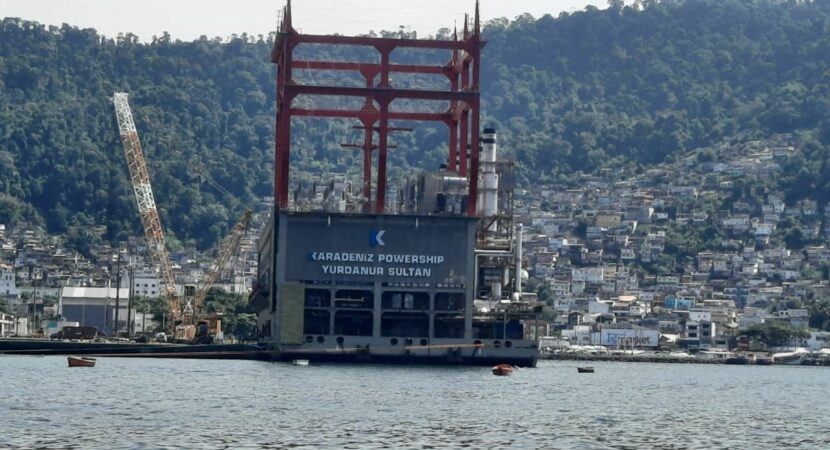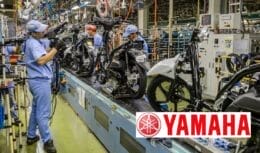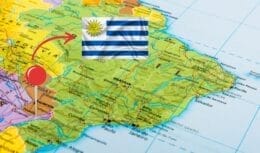
Of the 4 floating plants built by the Turkish company, one is already moored in the port of Angra dos Reis without any study on the consequences for the environment
More than R$ 3 billion were invested in the installation and operation of 4 floating thermoelectric plants powered by gas in Sepetiba Bay, close to the Port of Itaguaí, in the west zone of the city of Rio de Janeiro (RJ). The equipment was built by the Turkish company Karpowership, under state government contract. One of the plants is already moored at the Port of Angra dos Reis and another three are on the way. The project has great energy potential, but no environmental impact study has been presented and environmentalists already predict disasters for marine life. Understand all the controversy.
Watch the video and operation of a floating thermoelectric power plant anchored in Angra dos Reis
The information is that the State Environmental Control Commission – Here authorized the installation of 4 floating thermoelectric plants in the bay of Sepetiba, claiming that there is no need for Karpowership to present the environmental impact report, since the activity would not potentially cause significant consequences and because it is a temporary project and easy to demobilize .
The decision to dispense with the study, however, has been heavily criticized by environmentalists, prompting the Federal Public Ministry to file a lawsuit against the floating thermoelectric project. In addition to the plants, 36 transmission towers are to be installed, most of which are in the industrial district of Sepetiba and another 7 will be on rafts. According to the project, the complex has the capacity to produce 560 megawatts of energy, but is classified by environmental specialists as a high polluting potential.
In addition to the action to annul the floating thermoelectric plants, the Federal Public Prosecutor's Office in Rio de Janeiro had already asked the Justice to annul the installation license for the transmission towers on dry land. That is, at each moment a new chapter of the controversy is created.
Billion dollar project was developed at the height of the water crisis
Karpowership brought the thermoelectric plants to Sepetiba as it was the winner of the emergency auction by the National Electric Energy Agency (Aneel) for contracting reserve electricity. The dispute took place on October 25, 2021.
Energy from wind, solar and thermoelectric plants powered by diesel oil, fuel oil, biomass and natural gas was contracted to guarantee the continuity and security of the electricity supply in Brazil.
Karpowership's supply period runs until December 31, 2025 for the Southeast, Midwest and South regions, which were most affected by the lack of rain, which emptied hydroelectric reservoirs, causing the biggest water crisis in the last 9 decades and forcing the country to activate thermoelectric plants and promote readjustments in the electricity bill.
What do those involved in the controversy say?
The executive director of the Arayara Institute, Nicole Oliveira, says that the non-requirement of an environmental impact study was replaced by a series of studies after the ferry was implemented. “They want to control the quality of the water and air knowing that the project will already have been implemented”, she comments.
Specialist in fish ecology, Francisco Gerson de Araújo, warns that the functioning of the thermoelectric plants will increase the temperature of the water in the bay and, thus, threaten the marine fauna. “These thermoelectric plants will place around 6 cubic meters per second of water at 15 degrees above what they will collect, in a place with currents that carry the water into the bay”, he explains.
Also according to the expert, if the temperature in the bay of Sepetiba increases, it will affect the eggs and larvae of fish that use the place as a breeding ground. Inea, on the other hand, said that it has not yet been notified by the Federal Public Prosecutor's Office and, therefore, will only manifest itself at the appropriate time in relation to the action and the controversy.
Karpowership says it is up to standards
Karpowership clarifies that it was one of the winners of the reserve energy auction, held by Aneel in October 2021, which aims, according to the federal government's strategic planning, to guarantee energy supply for the country in the long term. The project won an auction promoted by EPE/ANEEl within the standards established by the MME.
The Turkish company has more than 25 years of expertise in the energy sector and follows the environmental licensing process determined by Inea (State Institute for the Environment). All environmental impact studies required by the environmental agency are being carried out and will be presented along with the socio-environmental compensation program defined in the CECA deliberation.
CECA's decision on carrying out an Environmental Impact Study (EIA/RIMA) does not exempt, under any circumstances, from Karpowership submitting technical studies that assess the potential socio-environmental impact of the undertaking.
The project will only start operating after the entire licensing process with all studies duly delivered and approved by the licensing authority. Every operation follows the best sustainability practices, complies with all the norms of the Brazilian legislation, including the international norms established by the World Bank.
Karpowership also clarifies that its energy generation project has a low environmental impact due to the fact that there is no construction and assembly, as in traditional thermal plants on land, therefore it does not bring permanent changes to the environment. The vessels will be anchored in the area of the Organized Port of Sepetiba, an area dedicated to activities with ships, for 44 months and then they will be demobilized, that is, completely removed, and the site will be fully reconstituted for the current condition. There will be no operation in any environmental conservation area.
The ships' motor generators use technology developed in Finland and Germany, countries recognized for producing state-of-the-art engineering, in addition to the equipment operating with high energy efficiency and low emissions.
Karpowership reinforces that sea water is only used to cool the engines and returned at a temperature within Conama's resolution standards. The project will also have a continuous monitoring program for the quality of water and marine sediment, in addition to analyzing benthic and planktonic organisms, ichthyofauna and cetaceans. In addition, underwater noise, impacts on fishing activity and waterway traffic and their signaling will be evaluated.












